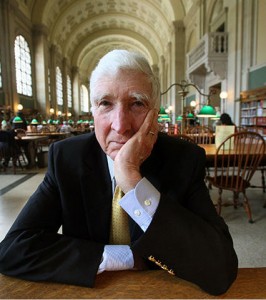 I have been accused on occasion of being relatively well read. Therefore, I feel obliged to confess that I had no interest in reading anything by John Updike until I saw the movie version of his novel The Witches of Eastwick in the late 1980s.
I have been accused on occasion of being relatively well read. Therefore, I feel obliged to confess that I had no interest in reading anything by John Updike until I saw the movie version of his novel The Witches of Eastwick in the late 1980s.
Even worse, when I finally set my mind to reading his then most celebrated novel, Rabbit is Rich, what the New York Times describes as his kaleidoscopic gift did little to sustain my interest. Although, I suspect this was due in part to the all-consuming interest I was developing in non-fiction.
Nevertheless, I was acutely aware over the years of Updike’s exalted place in the pantheon of American letters. After all, he was almost as renowned for his literary criticisms, essays and poems as he was for his novels. And his 61 books and the Pulitzers he won for two of his four-volume Rabbit series are living testaments in this respect.
Indeed, such was his influence that he incurred the wrath of feminist leaders who found the “clash of extremes in everyday dramas of marriage, sex and divorce” as depicted in his books patently chauvinistic, if not misogynistic.
 Ironically, it is this politically correct criticism of Updike that compels my tribute to him. It stems in fact from watching his last appearance a couple months ago on my favorite current affairs program – Charlie Rose. Because I found Updike’s exposition on the equal tendency of men and women towards the abusive use of power provocative and insightful.
Ironically, it is this politically correct criticism of Updike that compels my tribute to him. It stems in fact from watching his last appearance a couple months ago on my favorite current affairs program – Charlie Rose. Because I found Updike’s exposition on the equal tendency of men and women towards the abusive use of power provocative and insightful.
Here, in part, is how he posed this unassailably feminist proposition – appropriately enough in the context of promoting The Widows of Eastwick, a sequel to The Witches of Eastwick:
There is this notion that if only women could run the world there would be no war and no unpleasantness of any significant thought and I thought that if women did have power, the power of witches say, they would use the power much as men find themselves using it. That is to say to wreak justice of a harsh sort. This idea motivated me to write this book and it was about witches in the end turning on another witch, a junior witch, and being as much killers as men would be.
(Updike on Charlie Rose, November 12, 2008)
As an ardent feminist, I agree. After all, there’s a reason why some women are called … (rhymes with witches).
Updike died of cancer yesterday at home in Beverly Farms, Massachusetts. He was 76.
Farewell John
coffee says
I haven’t fallen in love with all of Updike’s work, though i do enjoy his candid writing style; his passing is a sad loss indeed